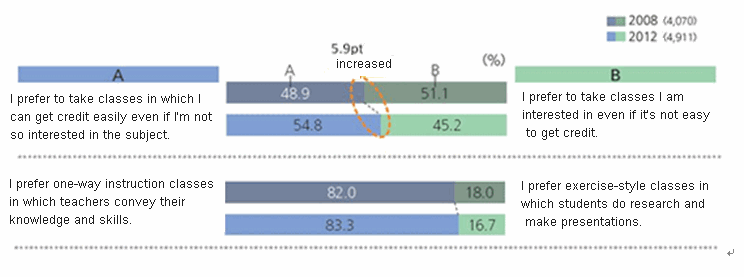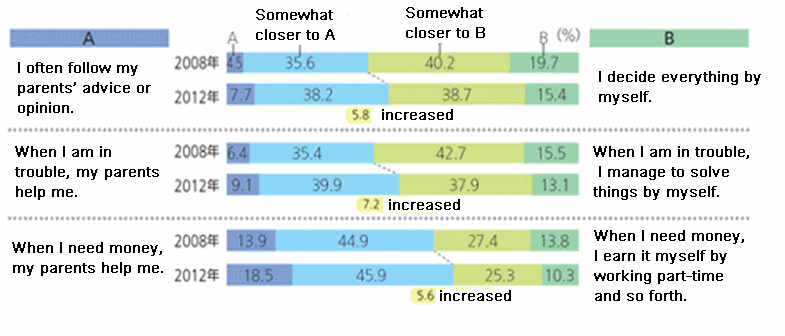Japan Moves Toward College Education that Focuses on Nurturing Independence
"Independence" is a term that has come to indicate a key concept when discussing the nurturing of college students. The business world strongly demands that students acquire independence as their most indispensable quality and ability. The Central Council for Education (Subdivision on University) has also proposed the reform of college education focusing on "independent-minded learning" as a central theme to qualitatively change bachelor programs at colleges. We need to nurture young people's ability to voluntarily set their own agenda and find their own answers as they continue their studies so that they can survive these unpredictable times. The goal is the acquisition of independence itself.
Sharing a common awareness of this social issue, a number of colleges have started educational reform. Benesse Educational Research & Development Institute conducted a survey of the Scholastic and Daily Life of University Students. A second survey, done four years later, found that an increasing number of colleges began to include discussion, presentation, group work, field work and so forth in their classes. Unlike traditional classes in Japan, these classes take a "participatory learning approach" that engages students as active participants. This approach is called "active learning" and it is now getting a lot of attention as a teaching method to promote independent-minded learning.
Students' Attitude Toward Classes is Still Passive
However, turning our eyes on the students themselves, a shift toward independence-minded learning is yet to be seen. The results of the survey of college students show an increase in the percentage of students who prefer "classes in which the student has no interest but credit can be easily earned" to "classes in which the student has an interest but credit is not easily earned". This increase was 55%, or 5.9% higher than 4 years ago (Table 1). Furthermore, the percentage of students who prefer "one-way instruction classes in which teachers convey their knowledge and skills" to "classes in which students do research and make presentations" in other words, "active learning", is an overwhelming 83.3%. I assume the reason for this is that students are so used to the one-way instruction classes they had in high school that they became unable to change their way of learning into an active learning style. Still, as a whole, students seem to have the attitude that, if they can easily get credit for a class, acquiring knowledge from one-way lectures is good enough. Japanese college students have always been said to have traditionally had this "passive attitude". Moreover, this tendency seems to be slightly increasing.
Colleges' efforts toward reform will continue into the future. On the other hand, if students' passive attitude continues to worsen, colleges will face a dilemma. In order to overcome this situation, what kind of approach would be effective, and to what kind of student, in raising their motivation? Regardless of the style of class, whether it be active learning or one-way lecture, effective teaching methods and curriculum need to be developed.
Deepening Trend Toward Students' Dependence
In addition to the concerns mentioned above, there is also concern over the change in students' basic nature. Their tendency to be dependent on parents and teachers is growing. Regarding their relationship with parents, the percentage of students who answered "I often follow my parents' advice or opinion" increased to 45.9%, 5.8% higher than that of 2008. The percentage of students who answered "When I am in trouble, my parents help me" also increased to 49.0%, 7.2% higher. Both percentages have increased to close to 50% (Table. 2).
In the background, there seems to be a psychology among students that asks for advice from parents as mentors in order to try to find a good job and manage to lead a decent life in these unpredictable and uncertain times. Viewed from the opposite side, parents and colleges also tend to be over-protective in an attempt to prompt students to lead a stable and decent life. However, it is during their college days that students become adults. Considering the process of natural development, they are supposed to be at the stage at which their self-directedness is increasing as an adult and they are trying to break away from being protected. The survey result shows a situation that runs counter to this theory. Even with the best of intentions, being too careful about their children's future independence or trying to set them on the right track could conversely hinder their child's natural ability to stand on his/her own.
Let's Consider New Ways to Help Young People Gain Independence
Taking all that was mentioned above into account, it turns out that in order to promote college students' independence and help them stand on their own, the ways in which adults relate to them need to change. I think the following two points are particularly crucial. First, a "non-interference policy for independence" should be decisively adopted. This does not mean that students do not have to study. It is inevitable that college students will face various challenging problems, including study and options for the future. However, adults around them should refrain as much as possible from interfering when students are in the process of overcoming their problems and let them deal with it and think things through on their own. For example, parents could give their child the freedom to repeat a year or take a year off if the choice is made with a strong sense of purpose and with full responsibility. In order for changes to take place, colleges and parents will need to heighten their awareness and have courage. These attempts need to be socially accepted as well.
Next, ideally, a basic attitude of independence should be cultivated by the time students graduate from high school. Considering that current college students as a whole are passive and dependent alike, this phenomenon could be thought to have been formed before they entered college. Regarding relations that promote independence in young people, parents, schools and communities have to reconsider their respective role in every stage of elementary school, junior high school and high school. Needless to say, an effort made by society as a whole is required.



 Enlarge
Enlarge Enlarge
Enlarge Enlarge
Enlarge Takeshi Higuchi, Benesse Educational Research & Development Institute
Takeshi Higuchi, Benesse Educational Research & Development Institute










